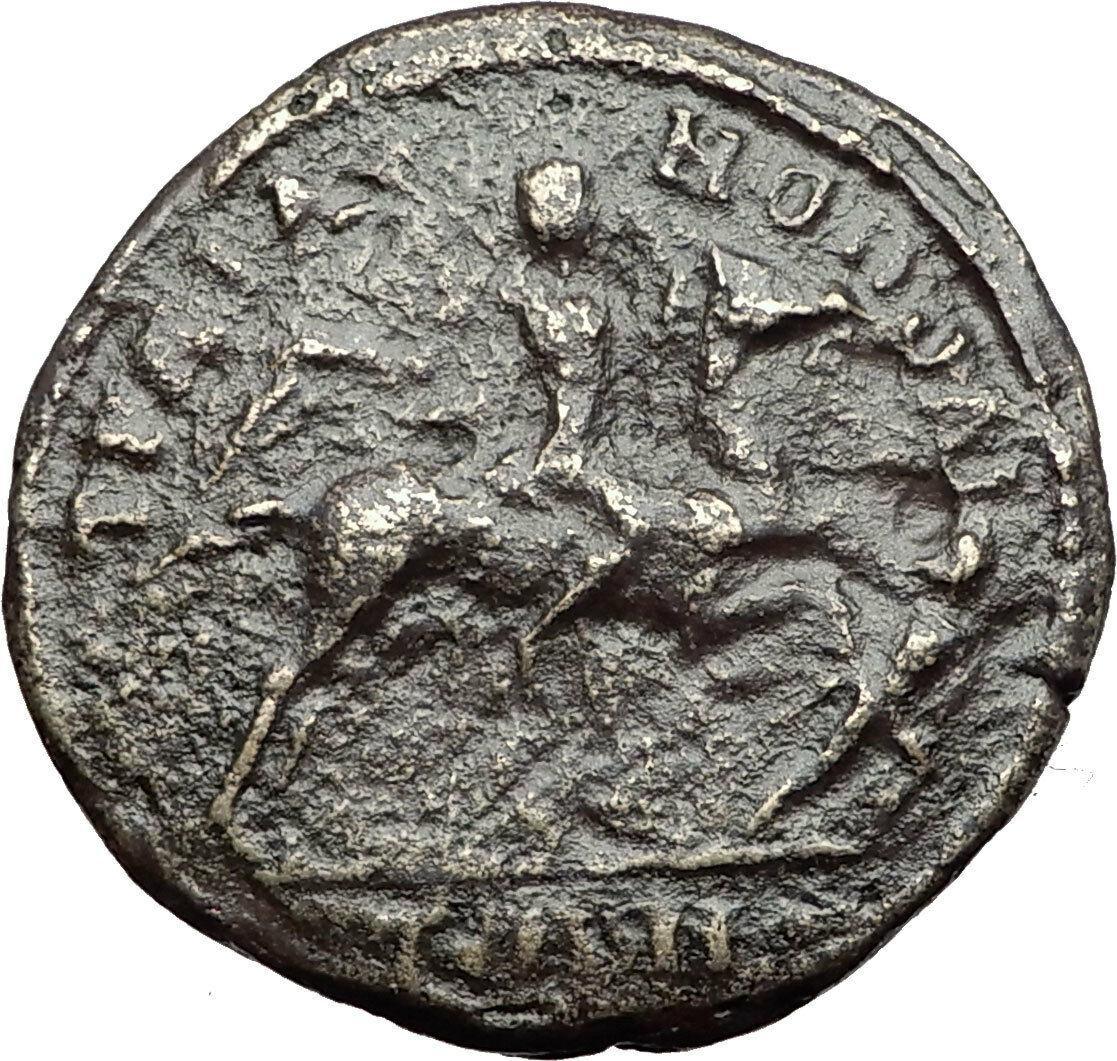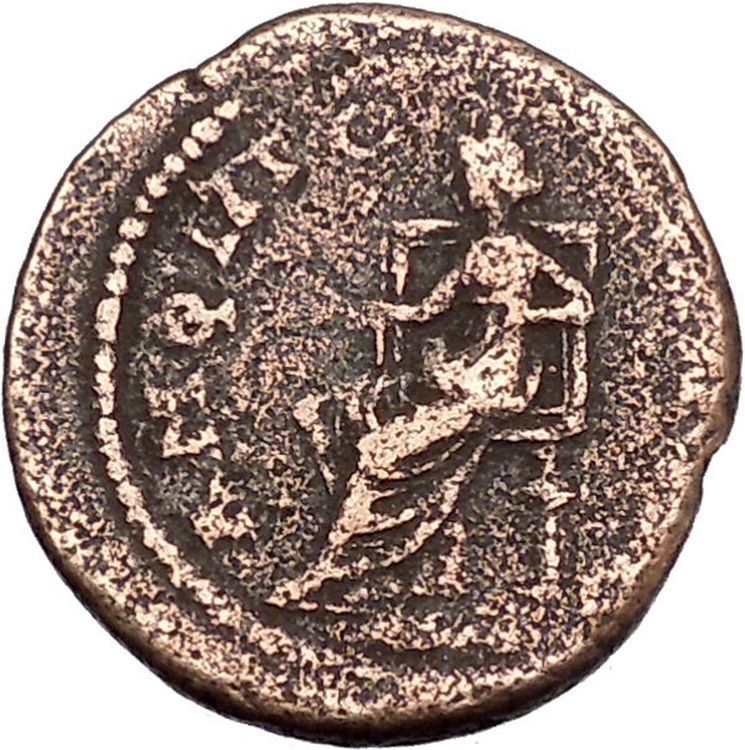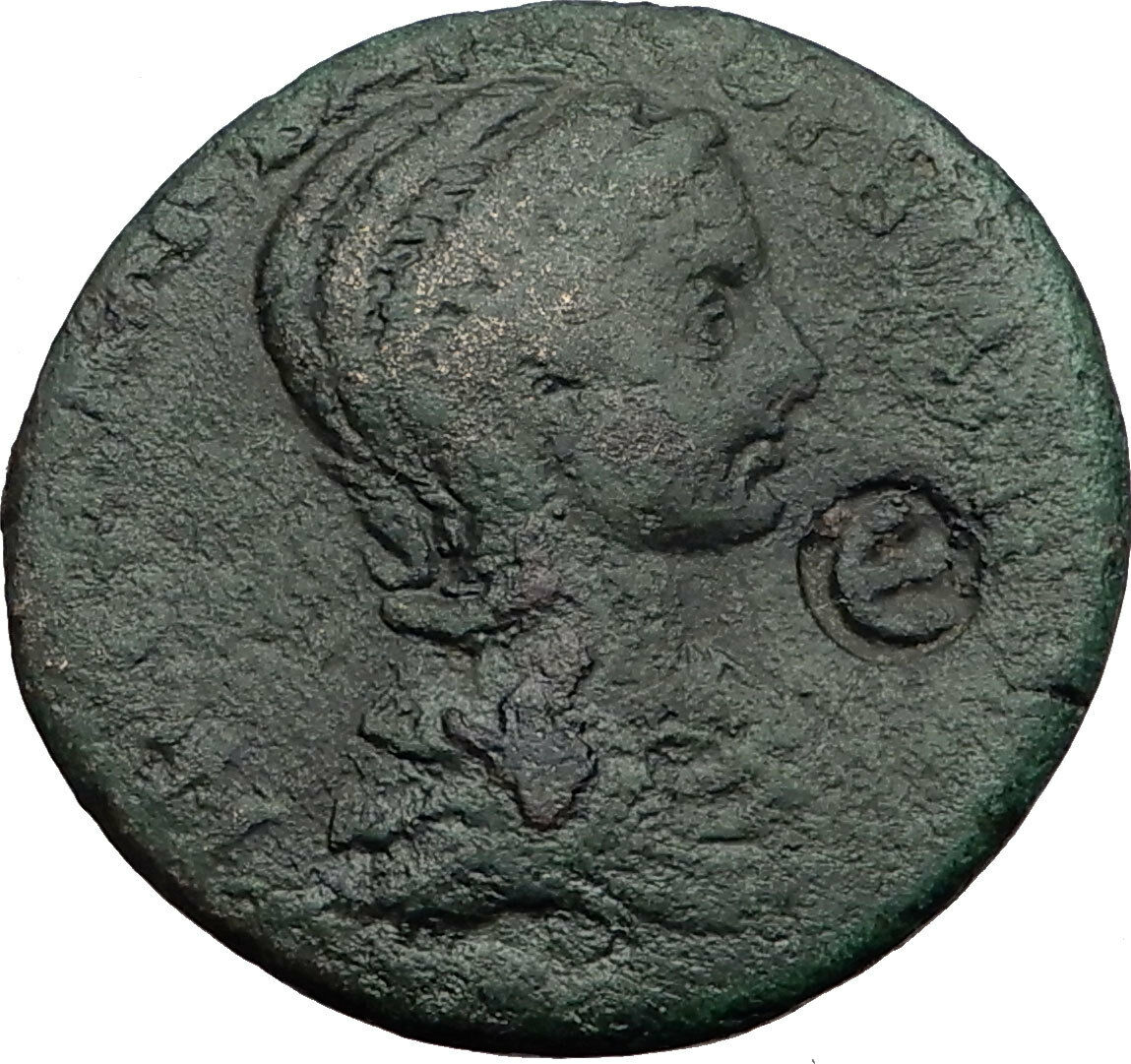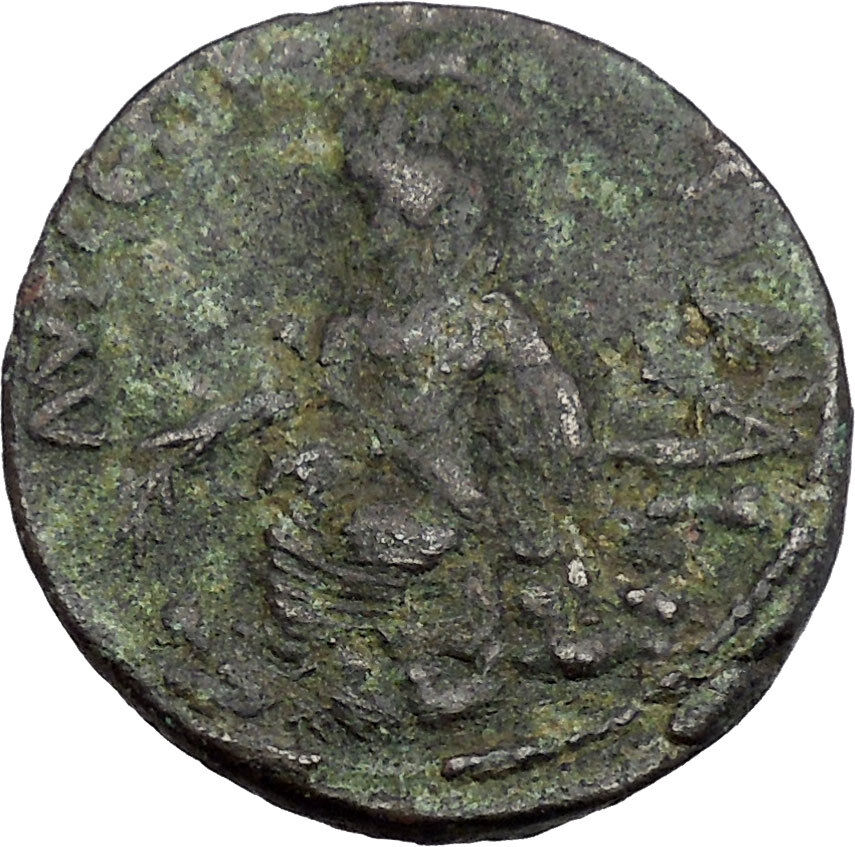|
Claudius – Roman Emperor: 41-54 A.D.
Claudius & his mother Antonia (Minor)
Billon Silver Tetradrachm 23mm (10.47 grams) of Alexandria in Egypt
Regnal Year 2 = 41/42 AD.
Reference: Dattari 114; Sear GIC 492; Köln 62-63; Emmett 73/2
Certification: NGC Ancients F 4375823-313
TI. KΛAYΔI. KAIΣ. ΣEBA. ΓERMANI AYTOKP, laureate head of Claudius right, LB (regnal date = A.D. 41/42) in lower right field.
ANTΩNIA ΣEBAΣTH, Draped bust of Antonia right.
Antonia was one of the two daughters of Augustus’ sister, Octavia and Mark Antony, both being named Antonia. Born in Athens in 36 B.C., she never got to know her father who committed suicide several years after divorcing her mother. She is the mother of Claudius and grandmother of Caligula.
You are bidding on the exact item pictured, provided with a Certificate of Authenticity and Lifetime Guarantee of Authenticity.
 Antonia Minor (PIR2 A 885), also known as Julia Antonia Minor, Antonia the Younger or simply Antonia (31 January 36 BC – September/October AD 37) was the younger of two daughters of Mark Antony and Octavia Minor. She was a niece of the Emperor Augustus, sister-in-law of the Emperor Tiberius, paternal grandmother of the Emperor Caligula and Empress Agrippina the Younger, mother of the Emperor Claudius, and both maternal great-grandmother and paternal great-aunt of the Emperor Nero. She was additionally the maternal great-aunt of the Empress Valeria Messalina and Faustus Cornelius Sulla Felix, the paternal grandmother of Claudia Antonia, Claudia Octavia, and Britannicus, the grandmother of Caligula and the maternal grandmother of Julia Livia and Tiberius Gemellus. Antonia Minor (PIR2 A 885), also known as Julia Antonia Minor, Antonia the Younger or simply Antonia (31 January 36 BC – September/October AD 37) was the younger of two daughters of Mark Antony and Octavia Minor. She was a niece of the Emperor Augustus, sister-in-law of the Emperor Tiberius, paternal grandmother of the Emperor Caligula and Empress Agrippina the Younger, mother of the Emperor Claudius, and both maternal great-grandmother and paternal great-aunt of the Emperor Nero. She was additionally the maternal great-aunt of the Empress Valeria Messalina and Faustus Cornelius Sulla Felix, the paternal grandmother of Claudia Antonia, Claudia Octavia, and Britannicus, the grandmother of Caligula and the maternal grandmother of Julia Livia and Tiberius Gemellus.
She was born in Athens, Greece and after 36 BC was brought to Rome by her mother and her siblings. Antonia never had the chance to know her father, Mark Antony, who divorced her mother in 32 BC and committed suicide in 30 BC. She was raised by her mother, her uncle and her aunt, Livia Drusilla. Due to inheritances, she owned properties in Italy, Greece and Egypt. She was a wealthy and influential woman who often received people who were visiting Rome. Antonia had many male friends and they included wealthy Jew Alexander the Alabarch and Lucius Vitellius, a consul and father of future Emperor Aulus Vitellius.
In 16 BC, she married the Roman general and consul Nero Claudius Drusus. Drusus was the stepson of her uncle Augustus, second son of Livia Drusilla and brother of future Emperor Tiberius. They had several children, but only three survived: the famous general Germanicus, Livilla and the Roman Emperor Claudius. Antonia was the grandmother of the Emperor Caligula, the Empress Agrippina the Younger and through Agrippina, great-grandmother and great-aunt of the Emperor Nero. Drusus died in June 9 BC in Germany, due to complications from injuries he sustained after falling from a horse. After his death, although pressured by her uncle to remarry, she never did.
Antonia raised her children in Rome. Tiberius adopted Germanicus in AD 4 (Suetonius Tiberius 15, Gai. 1., Div. Claudius 2). Germanicus died in 19 AD, allegedly poisoned through the handiwork of Gnaeus Calpurnius Piso and Munatia Plancina. On the orders of Tiberius and Livia Drusilla, Antonia was forbidden to go to his funeral (suggested, but not stated by Tacitus Annals 3.3). When Livia Drusilla died in June 29 AD, Antonia took care of Caligula, Agrippina the Younger, Julia Drusilla, Julia Livilla and later Claudia Antonia, Claudius’s daughter through his second wife Aelia Paetina, her younger grandchildren.
She outlived her husband, her oldest son, her daughter and several of her grandchildren.
Conflict with Livilla
In 31 AD, Antonia exposed a plot by her daughter Livilla and Tiberius’ notorious Praetorian prefect, Sejanus, to murder the Emperor Tiberius and Caligula and to seize the throne for themselves. Livilla had allegedly poisoned her husband, Tiberius’ son, Drusus Julius Caesar (nicknamed “Castor”) to remove him as a rival. Sejanus was executed on Tiberius’ orders, and Livilla was handed over to her formidable mother for punishment. Cassius Dio states that Antonia imprisoned Livilla in her room until she starved to death.
Succession of Caligula and death
When Tiberius died, Caligula became emperor in March 37 AD. Caligula awarded her a senatorial decree, granting her all the honors that Livia Drusilla had received in her lifetime. She was also offered the title of Augusta, previously only given to Augustus’s wife Livia, but rejected it.
Six months into his reign, Caligula became seriously ill. Antonia would often offer Caligula advice, but he once told her, “I can treat anyone exactly as I please!”. Caligula was rumored to have had his young cousin Gemellus beheaded, to remove him as a rival to the throne. This act was said to have outraged Antonia, who was grandmother to Gemellus as well as to Caligula.
Having had enough of Caligula’s anger at her criticisms and of his behavior, she committed suicide. Suetonius’s Caligula, clause 23, mentions how he might have poisoned her.
When his grandmother Antonia asked for a private interview, he refused it except in the presence of the prefect Macro, and by such indignities and annoyances he caused her death; although some think that he also gave her poison. After she was dead, he paid her no honour, but viewed her burning pyre from his dining-room.
When Claudius became emperor after his nephew’s assassination in 41 AD, he gave his mother the title of Augusta. Her birthday became a public holiday, which had yearly games and public sacrifices held. An image of her was paraded in a carriage.
In popular culture
Antonia is one of the main characters in the novel I, Claudius. In the television adaptation of the book she is portrayed by Margaret Tyzack. She is a loyal wife deeply in love with her husband Drusus; however, she is unloving towards her son Claudius whom she regards as a fool. Furthermore, after finding evidence that she murdered her husband Drusus Julius Caesar and rightfully believing she was also poisoning her daughter for the same reason, she kills Livilla by locking her in her room until she starves to death. During the reign of Caligula she is so disgusted by the state of Rome that she commits suicide.
She is a leading character in the novel by Lindsey Davis, The Course of Honour (1997), where she guides and advises Claudius and his supporters.
Antonia was indirectly mentioned by Tiberius (played by André Morell), who noted that Germanicus was a blood relative of Augustus on his mother’s [Antonia] side, in the 1968 ITV historical drama The Caesars..
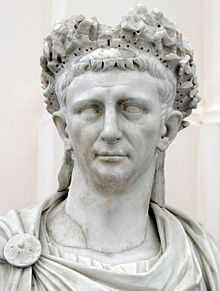 Claudius – Roman Emperor: 41-54 A.D. Claudius – Roman Emperor: 41-54 A.D.
| Son of Nero Claudius Drusus and Antonia | Brother of Germanicus and Livilla | Husband of Plautia Urgulanilla, Aelia Paetina, Valeria Messalina and Agrippina Junior | Father of Britannicus, Claudia Octavia and Claudia Antonia | Granduncle and adoptive step-father of Nero | Nephew of Tiberius | Grandson of Livia, Mark Antony and Octavia | Uncle of Nero Caesar, Drusus Caesar, Caligula, Agrippina Junior, Drusilla, Julia Livilla, Tiberius Gemellus, Germanicus Gemellus and Livia Julia | Brother-in-law of Gaius Caesar, Drusus and Agrippina Senior |
Tiberius Claudius Caesar Augustus Germanicus (1 August 10 BC – 13 October AD 54) (Tiberius Claudius Drusus from birth to AD 4, then Tiberius Claudius Nero Germanicus from then until his accession) was the fourth Roman Emperor, a member of the Julio-Claudian dynasty, ruling from 24 January AD 41 to his death in AD 54. Born in Lugdunum in Gaul (modern-day Lyon, France), to Drusus and Antonia Minor, he was the first Roman Emperor to be born outside Italia.
He was reportedly afflicted with some type of disability, and his family had virtually excluded him from public office until his consulship with his nephew Caligula in AD 37. This infirmity may have saved him from the fate of many other Roman nobles during the purges of Tiberius‘ and Caligula’s reigns; potential enemies did not see him as a serious threat to them. His very survival led to his being declared emperor (reportedly because the Praetorian Guard insisted) after Caligula’s assassination, at which point he was the last adult male of his family.
Despite his lack of political experience, Claudius proved to be an able administrator and a great builder of public works. His reign saw an expansion of the empire, including the conquest of Britain. He took a personal interest in the law, presided at public trials, and issued up to 20 edicts a day; however, he was seen as vulnerable throughout his rule, particularly by the nobility. Claudius was constantly forced to shore up his position. This resulted in the deaths of many senators. Claudius also suffered setbacks in his personal life, one of which may have led to his murder. These events damaged his reputation among the ancient writers, though more recent historians have revised this opinion.
Claudius was born on 1 August 10 BC, in Lugdunum, Gaul, on the day of the dedication of an altar to Augustus. His parents were Nero Claudius Drusus and Antonia, and he had two older siblings named Germanicus and Livilla. Antonia may have had two other children who died young, as well.
His maternal grandparents were Mark Antony and Octavia Minor, Caesar Augustus’ sister, and as such he was the great-great grandnephew of Gaius Julius Caesar. His paternal grandparents were Livia, Augustus’ third wife, and Tiberius Claudius Nero. During his reign, Claudius revived the rumor that his father Drusus was actually the illegitimate son of Augustus, to give the false appearance that Augustus was Claudius’ paternal grandfather.
In 9 BC, Drusus unexpectedly died on campaign in Germania, possibly from illness. Claudius was then left to be raised by his mother, who never remarried. When Claudius’ disability became evident, the relationship with his family turned sour. Antonia referred to him as a monster, and used him as a standard for stupidity. She seems to have passed her son off on his grandmother Livia for a number of years. Livia was little kinder, and often sent him short, angry letters of reproof. He was put under the care of a “former mule-driver” to keep him disciplined, under the logic that his condition was due to laziness and a lack of will-power. However, by the time he reached his teenage years his symptoms apparently waned and his family took some notice of his scholarly interests. In AD 7, Livy was hired to tutor him in history, with the assistance of Sulpicius Flavus. He spent a lot of his time with the latter and the philosopher Athenodorus. Augustus, according to a letter, was surprised at the clarity of Claudius’ oratory. Expectations about his future began to increase.
Ironically, it was his work as a budding historian that destroyed his early career. According to Vincent Scramuzza and others, Claudius began work on a history of the Civil Wars that was either too truthful or too critical of Octavian. In either case, it was far too early for such an account, and may have only served to remind Augustus that Claudius was Antony’s descendant. His mother and grandmother quickly put a stop to it, and this may have proved to them that Claudius was not fit for public office. He could not be trusted to toe the existing party line. When he returned to the narrative later in life, Claudius skipped over the wars of the second triumvirate altogether. But the damage was done, and his family pushed him to the background. When the Arch of Pavia was erected to honor the imperial clan in AD 8, Claudius’ name (now Tiberius Claudius Nero Germanicus after his elevation to paterfamilias of Claudii Nerones on the adoption of his brother) was inscribed on the edge—past the deceased princes, Gaius and Lucius, and Germanicus’ children. There is some speculation that the inscription was added by Claudius himself decades later, and that he originally did not appear at all.
When Augustus died in AD 14, Claudius — then 23 — appealed to his uncle Tiberius to allow him to begin the cursus honorum. Tiberius, the new emperor, responded by granting Claudius consular ornaments. Claudius requested office once more and was snubbed. Since the new emperor was not any more generous than the old, Claudius gave up hope of public office and retired to a scholarly, private life.
Despite the disdain of the imperial family, it seems that from very early on the general public respected Claudius. At Augustus’ death, the equites, or knights, chose Claudius to head their delegation. When his house burned down, the Senate demanded it be rebuilt at public expense. They also requested that Claudius be allowed to debate in the senate. Tiberius turned down both motions, but the sentiment remained. During the period immediately after the death of Tiberius’ son, Drusus, Claudius was pushed by some quarters as a potential heir. This again suggests the political nature of his exclusion from public life. However, as this was also the period during which the power and terror of the Praetorian Sejanus was at its peak, Claudius chose to downplay this possibility.
After the death of Tiberius the new emperor Caligula (the son of Claudius’ brother Germanicus) recognized Claudius to be of some use. He appointed Claudius his co-consul in AD 37 in order to emphasize the memory of Caligula’s deceased father Germanicus. Despite this, Caligula relentlessly tormented his uncle: playing practical jokes, charging him enormous sums of money, humiliating him before the Senate, and the like. According to Cassius Dio, as well a possible surviving portrait, Claudius became very sickly and thin by the end of Caligula’s reign, most likely due to stress.
On 24 January, AD 41, Caligula was assassinated by a broad-based conspiracy (including Praetorian commander Cassius Chaerea and several Senators). There is no evidence that Claudius had a direct hand in the assassination, although it has been argued that he knew about the plot — particularly since he left the scene of the crime shortly before his nephew was murdered. However, after the deaths of Caligula’s wife and daughter, it became apparent that Cassius intended to go beyond the terms of the conspiracy and wipe out the imperial family. In the chaos following the murder, Claudius witnessed the German guard cut down several uninvolved noblemen, including many of his friends. He fled to the palace to hide. According to tradition, a Praetorian named Gratus found him hiding behind a curtain and suddenly declared him princeps. A section of the guard may have planned in advance to seek out Claudius, perhaps with his approval. They reassured him that they were not one of the battalions looking for revenge. He was spirited away to the Praetorian camp and put under their protection.
The Senate quickly met and began debating a change of government, but this eventually devolved into an argument over which of them would be the new Princeps. When they heard of the Praetorians’ claim, they demanded that Claudius be delivered to them for approval, but he refused, sensing the danger that would come with complying. Some historians, particularly Josephus, claim that Claudius was directed in his actions by the Judean King Herod Agrippa. However, an earlier version of events by the same ancient author downplays Agrippa’s role — so it is not known how large a hand he had in things. Eventually the Senate was forced to give in and, in return, Claudius pardoned nearly all the assassins.
Claudius took several steps to legitimize his rule against potential usurpers, most of them emphasizing his place within the Julio-Claudian family. He adopted the name “Caesar” as a cognomen — the name still carried great weight with the populace. In order to do so, he dropped the cognomen “Nero” which he had adopted as paterfamilias of the Claudii Nerones when his brother Germanicus was adopted out. While he had never been adopted by Augustus or his successors, he was the grandson of Octavia, and so felt he had the right. He also adopted the name “Augustus” as the two previous emperors had done at their accessions. He kept the honorific “Germanicus” in order to display the connection with his heroic brother. He deified his paternal grandmother Livia in order to highlight her position as wife of the divine Augustus. Claudius frequently used the term “filius Drusi” (son of Drusus) in his titles, in order to remind the people of his legendary father and lay claim to his reputation.
Because he was proclaimed emperor on the initiative of the Praetorian Guard instead of the Senate — the first emperor thus proclaimed — Claudius’ repute suffered at the hands of commentators (such as Seneca). Moreover, he was the first Emperor who resorted to bribery as a means to secure army loyalty. Tiberius and Augustus had both left gifts to the army and guard in their wills, and upon Caligula’s death the same would have been expected, even if no will existed. Claudius remained grateful to the guard, however, issuing coins with tributes to the praetorians in the early part of his reign.
Expansion of the empire
Under Claudius, the empire underwent its first major expansion since the reign of Augustus. The provinces of Thrace, Noricum, Pamphylia, Lycia, and Judea were annexed under various circumstances during his term. The annexation of Mauretania, begun under Caligula, was completed after the defeat of rebel forces, and the official division of the former client kingdom into two imperial provinces. The most important new expansion was the conquest of Britannia.
In AD 43, Claudius sent Aulus Plautius with four legions to Britain (Britannia) after an appeal from an ousted tribal ally. Britain was an attractive target for Rome because of its material wealth — particularly mines and slaves. It was also a haven for Gallic rebels and the like, and so could not be left alone much longer. Claudius himself traveled to the island after the completion of initial offensives, bringing with him reinforcements and elephants. The latter must have made an impression on the Britons when they were used in the capture of Camulodunum. He left after 16 days, but remained in the provinces for some time. The Senate granted him a triumph for his efforts, as only members of the imperial family were allowed such honors. Claudius later lifted this restriction for some of his conquering generals. He was granted the honorific “Britannicus” but only accepted it on behalf of his son, never using the title himself. When the British general Caractacus was captured in AD 50, Claudius granted him clemency. Caractacus lived out his days on land provided by the Roman state, an unusual end for an enemy commander.
Claudius conducted a census in AD 48 that found 5,984,072 Roman citizens, an increase of around a million since the census conducted at Augustus’ death. He had helped increase this number through the foundation of Roman colonies that were granted blanket citizenship. These colonies were often made out of existing communities, especially those with elites who could rally the populace to the Roman cause. Several colonies were placed in new provinces or on the border of the empire in order to secure Roman holdings as quickly as possible.
Judicial and legislative affairs
Claudius personally judged many of the legal cases tried during his reign. Ancient historians have many complaints about this, stating that his judgments were variable and sometimes did not follow the law. He was also easily swayed. Nevertheless, Claudius paid detailed attention to the operation of the judicial system. He extended the summer court session, as well as the winter term, by shortening the traditional breaks. Claudius also made a law requiring plaintiffs to remain in the city while their cases were pending, as defendants had previously been required to do. These measures had the effect of clearing out the docket. The minimum age for jurors was also raised to 25 in order to ensure a more experienced jury pool.
Claudius also settled disputes in the provinces. He freed the island of Rhodes from Roman rule for their good faith and exempted Troy from taxes. Early in his reign, the Greeks and Jews of Alexandria sent him two embassies at once after riots broke out between the two communities. This resulted in the famous “Letter to the Alexandrians”, which reaffirmed Jewish rights in the city but also forbade them to move in more families en masse. According to Josephus, he then reaffirmed the rights and freedoms of all the Jews in the empire. An investigator of Claudius’ discovered that many old Roman citizens based in the modern city of Trento were not in fact citizens. The emperor issued a declaration that they would be considered to hold citizenship from then on, since to strip them of their status would cause major problems. However, in individual cases, Claudius punished false assumption of citizenship harshly, making it a capital offense. Similarly, any freedmen found to be impersonating equestrians were sold back into slavery.
Numerous edicts were issued throughout Claudius’ reign. These were on a number of topics, everything from medical advice to moral judgments. Two famous medical examples are one promoting Yew juice as a cure for snakebite, and another promoting public flatulence for good health. One of the more famous edicts concerned the status of sick slaves. Masters had been abandoning ailing slaves at the temple of Aesculapius to die, and then reclaiming them if they lived. Claudius ruled that slaves who recovered after such treatment would be free. Furthermore, masters who chose to kill slaves rather than take the risk were liable to be charged with murder.
|









 Antonia Minor (PIR2 A 885), also known as Julia Antonia Minor, Antonia the Younger or simply Antonia (31 January 36 BC – September/October AD 37) was the younger of two daughters of Mark Antony and Octavia Minor. She was a niece of the Emperor Augustus, sister-in-law of the Emperor Tiberius, paternal grandmother of the Emperor Caligula and Empress Agrippina the Younger, mother of the Emperor Claudius, and both maternal great-grandmother and paternal great-aunt of the Emperor Nero. She was additionally the maternal great-aunt of the Empress Valeria Messalina and Faustus Cornelius Sulla Felix, the paternal grandmother of Claudia Antonia, Claudia Octavia, and Britannicus, the grandmother of Caligula and the maternal grandmother of Julia Livia and Tiberius Gemellus.
Antonia Minor (PIR2 A 885), also known as Julia Antonia Minor, Antonia the Younger or simply Antonia (31 January 36 BC – September/October AD 37) was the younger of two daughters of Mark Antony and Octavia Minor. She was a niece of the Emperor Augustus, sister-in-law of the Emperor Tiberius, paternal grandmother of the Emperor Caligula and Empress Agrippina the Younger, mother of the Emperor Claudius, and both maternal great-grandmother and paternal great-aunt of the Emperor Nero. She was additionally the maternal great-aunt of the Empress Valeria Messalina and Faustus Cornelius Sulla Felix, the paternal grandmother of Claudia Antonia, Claudia Octavia, and Britannicus, the grandmother of Caligula and the maternal grandmother of Julia Livia and Tiberius Gemellus. Claudius – Roman Emperor: 41-54 A.D.
Claudius – Roman Emperor: 41-54 A.D.

